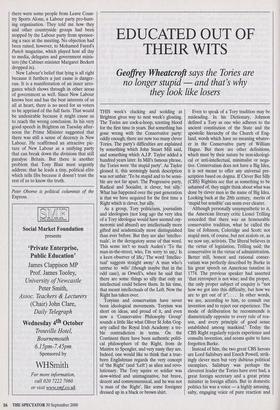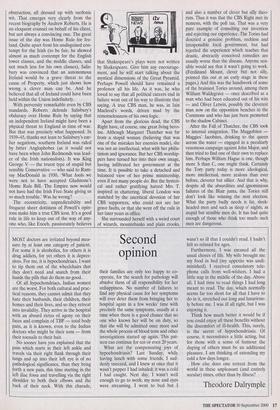EDUCATED OUT OF THEIR WITS
Geoffrey Wheatcroft says the Tories are no longer stupid — and that's why they look like losers
THIS week's clucking and scolding at Brighton gives way to next week's gloating. The Tories are cock-a-hoop, scenting blood for the first time in years. But something has gone wrong with the Conservative party: oddly enough, there are now too many clever Tories. The party's difficulties are explained by something which John Stuart Mill said, and something which A.J.P. Taylor added a hundred years later. In Mill's famous phrase, the Tories were 'the stupid party'. As Taylor glossed it, this seemingly harsh description was not unfair: 'To be stupid and to be sensi- ble are not far apart. The Progressive party, Radical and Socialist, is clever, but silly.' What has happened over the past generation is that we have acquired for the first time a Right which is clever, but silly.
As a group, Tory politicians, journalists and ideologues (not long ago the very idea of a Tory ideologue would have seemed oxy- moronic and absurd) are intellectually more gifted and academically more distinguished than ever before. But they are also 'intellec- tuals', in the derogatory sense of that word. This sense isn't so much Auden's 'To the man-in-the-street, who, I'm sorry to say,/ Is a keen observer of life,/ The word 'Intellec- tual' suggests straight away/ A man who's untrue to wife' (though maybe that in the odd case), as Orwell's, when he said that there are some things so silly that only an intellectual could believe them. In his time, that meant intellectuals of the Left. Now the Right has taken over.
Toryism and conservatism have never been ideological movements. Toryism was short on ideas, and proud of it, and even now a 'Conservative Philosophy Group' sounds a little like what Oliver St John Gog- arty called the Royal Irish Academy: a tre- ble contradiction in terms. On the Continent there have been authentic politi- cal philosophers of the Right, from de Maistre to Spengler, and very nasty they are. Indeed, one would like to think that a true- born Englishman regards the very concept of 'the Right' (and 'Left') as alien and revo- lutionary. The Tory squire or soldier was slow-witted and unimaginative, but brave, decent and commonsensical, and he was not `a man of the Right', like some foreigner dressed up in a black or brown shirt. Even to speak of a Tory tradition may be misleading. In his Dictionary, Johnson defined a Tory as one who adheres to the ancient constitution of the State and the apostolic hierarchy of the Church of Eng- land, words which have no meaning whatev- er in the Conservative party of William Hague. But there are other definitions, which must by their nature be non-ideologi- cal or anti-intellectual, minimalist or nega- tive. Conservatism does not have a Big Idea, it is not meant to offer any universal pre- scription based on dogma. If Clever But Silly (CBS) Rightists see that as something to be ashamed of, they might think about what was done by clever men in the name of Big Idea. Looking back at the 20th century, merits of `stupid but sensible' can seem ever clearer.
Although personally unsympathetic to it, the American literary critic Lionel Trilling conceded that there was an honourable conservative tradition, what he called the line of Johnson, Coleridge and Scott: not stupid men, of course, but not zealots or, as we now say, activists. The liberal believes in the virtue of legislation, Trilling said; the conservative in the virtue of administration. Better still, honest and rational conser- vatism was perfectly described by Burke in his great speech on American taxation in 1774. The previous speaker had asserted `that retrospect is not wise; and the proper, the only proper subject of enquiry is "not how we got into this difficulty, but how we are to get out of it". . . . In other words, we are, according to him, to consult our invention and to reject our experience. The mode of deliberation he recommends is diametrically opposite to every rule of rea- son, and every principle of good sense established among mankind.' Today the CBS Right regularly rejects experience and consults invention, and seems quite to have forgotten Burke.
Instead of him, the two great CBS heroes are Lord Salisbury and Enoch Powell, strik- ingly clever men but very dubious political exemplars. Salisbury was perhaps the cleverest leader the Tories have ever had, a great foreign secretary and a great prime minister in foreign affairs. But in domestic politics his was a voice — a highly amusing, salty, engaging voice of pure reaction and obstruction, all dressed up with sardonic wit. That emerges very clearly from the recent biography by Andrew Roberts. He is an eloquent counsel on behalf of his client, but not always a convincing one. The great issue of the day was Home Rule for Ire- land. Quite apart from his undisguised con- tempt for the Irish (to be fair, he showed almost as much contempt for the English lower classes, and the middle classes, and not much less for his own classes), Salis- bury was convinced that an autonomous Ireland would be a grave threat to the cause of Property, which just shows how wrong a clever man can be. And he believed that all of Ireland could have been held within the Union indefinitely.
With perversity remarkable even by CBS standards, Roberts defends Salisbury's obduracy over Home Rule by saying that an independent Ireland might have been a physical threat to England in time of war. But that was precisely what happened. In 1939-45, thanks not least to Salisbury's ear- lier negations, southern Ireland was ruled by bitter Anglophobes (as it would not have been when John Redmonds was lead- er of the Irish nationalists). It was King George V — the truest type of stupid but sensible Conservative — who said to Ram- say MacDonald in 1930, 'What fools we were not to have accepted Gladstone's Home Rule Bill. The Empire now would not have had the Irish Free State giving us so much trouble.' Was he wrong?
The eccentricity, unpredictability and frequent sheer dottiness of Powell's opin- ions make him a true CBS icon. It's a good rule in life to keep out of the way of any- one who, like Enoch, passionately believes that Shakespeare's plays were not written by Shakespeare. Give him any encourage- ment, and he will start talking about the mystical dimensions of the Great Pyramid. Perhaps Powell should have remained a professor all his life. As it was, he who loved to say that all political careers end in failure went out of his way to illustrate that saying. A true CBS man, he was, in Iain Macleod's words, driven mad by the remorselessness of his own logic.
Apart from the glorious dead, the CBS Right have, of course, one great living hero- ine. Although Margaret Thatcher was far from a stupid woman (believing that was One of the mistakes her enemies made), she was not an intellectual, what with her philis- tinism and ignorance. But her CBS worship- pers have turned her into their own image, having infiltrated her government at the time. It is possible to take a detached and balanced view of her prime ministership, even if not many people do. But the hysteri- cal and rather gratifying hatred Mrs T. inspired in chattering, liberal London was matched by the uncritical devotion of her CBS supporters, who could not see her grave faults, or that she went off the rails in her later years in office.
She surrounded herself with a weird court of wizards, mountebanks and plain crooks, and also a number of clever but silly theo- rists. Thus it was that the CBS Right met its nemesis, with the poll tax. That was a very pure example of consulting our invention and rejecting our experience. The Tories had descried a genuine problem, reckless and irresponsible local government, but had rejected the experience which teaches that drastic, abstractly conceived remedies are usually worse than the disease. Anyone sen- sible would see that it wasn't going to work. (Ferdinand Mount, clever but not silly, pointed this out at an early stage in these pages.) And this was the handiwork of some of the brainiest Tories around, among them William Waldegrave — once described as a man who had been educated out of his wits — and Oliver Letwin, possibly the cleverest man now on the opposition benches in the Commons and who has just been promoted to the shadow Cabinet.
After the Fall of Thatcher, the CBS took to internal emigration. The Maggobites — Maggies' Jacobites, drinking to the queen across the water — engaged in a peculiarly venomous campaign against John Major, and then tried to find one of their own to replace him. Perhaps William Hague is one, though more S than C, one might think. Certainly the Tory party today is more ideological. more intellectual, more zealous than ever before, cleverer but sillier. And that is why. despite all the absurdities and ignominious failures of the Blair junta, the Tories still don't look like winning the next election. What the party badly needs is fat, sleek- headed men and such as sleep o' nights, as stupid but sensible men do. It has had quite enough of those who think too much: such men are dangerous.



























































































 Previous page
Previous page